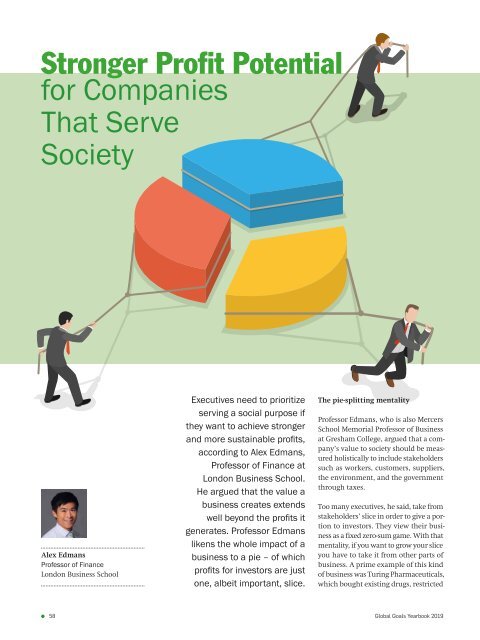Aliging Profit with Purpose - Global Goals Yearbook 2019
What are companies for? The rules for companies have changed. The focus is increasingly on their sustainable, social, and ecological impacts. The strategic orientation toward the so-called corporate purpose is decisive for profitable growth in the future. This currently results in a large number of questions for businesses: How do you find an inspiring and future-oriented corporate purpose, and how can it be aligned in such a way that it brings profitable growth and social responsibility in concert? The new 2019 edition of the Global Goals Yearbook offers answers to these crucial questions thanks to its consistent orientation toward the UN Sustainable Development Goals and a competent editorial board and author pool.
What are companies for? The rules for companies have changed. The focus is increasingly on their sustainable, social, and ecological impacts. The strategic orientation toward the so-called corporate purpose is decisive for profitable growth in the future.
This currently results in a large number of questions for businesses: How do you find an inspiring and future-oriented corporate purpose, and how can it be aligned in such a way that it brings profitable growth and social responsibility in concert? The new 2019 edition of the Global Goals Yearbook offers answers to these crucial questions thanks to its consistent orientation toward the UN Sustainable Development Goals and a competent editorial board and author pool.
Create successful ePaper yourself
Turn your PDF publications into a flip-book with our unique Google optimized e-Paper software.
Stronger <strong>Profit</strong> Potential<br />
for Companies<br />
That Serve<br />
Society<br />
Alex Edmans<br />
Professor of Finance<br />
London Business School<br />
Executives need to prioritize<br />
serving a social purpose if<br />
they want to achieve stronger<br />
and more sustainable profits,<br />
according to Alex Edmans,<br />
Professor of Finance at<br />
London Business School.<br />
He argued that the value a<br />
business creates extends<br />
well beyond the profits it<br />
generates. Professor Edmans<br />
likens the whole impact of a<br />
business to a pie – of which<br />
profits for investors are just<br />
one, albeit important, slice.<br />
The pie-splitting mentality<br />
Professor Edmans, who is also Mercers<br />
School Memorial Professor of Business<br />
at Gresham College, argued that a company’s<br />
value to society should be measured<br />
holistically to include stakeholders<br />
such as workers, customers, suppliers,<br />
the environment, and the government<br />
through taxes.<br />
Too many executives, he said, take from<br />
stakeholders’ slice in order to give a portion<br />
to investors. They view their business<br />
as a fixed zero-sum game. With that<br />
mentality, if you want to grow your slice<br />
you have to take it from other parts of<br />
business. A prime example of this kind<br />
of business was Turing Pharmaceuticals,<br />
which bought existing drugs, restricted<br />
58 <strong>Global</strong> <strong>Goals</strong> <strong>Yearbook</strong> <strong>2019</strong>

















